#Henry Mancini and Patrick Watson
Photo
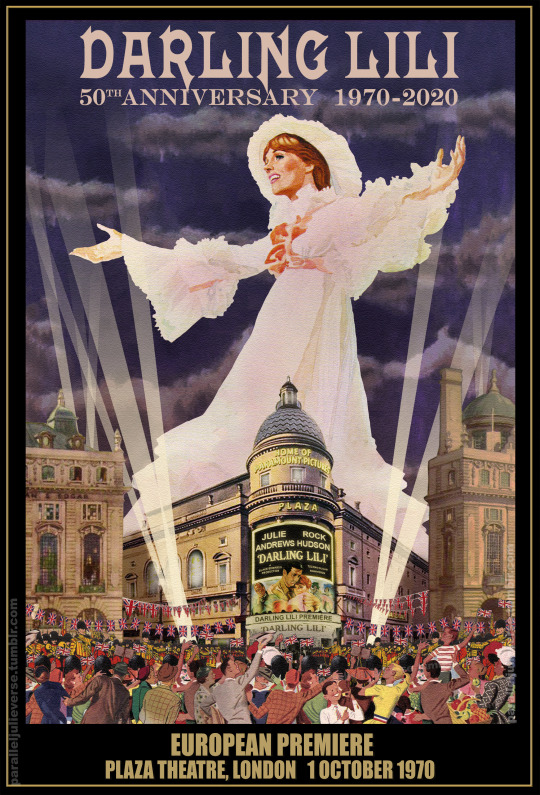
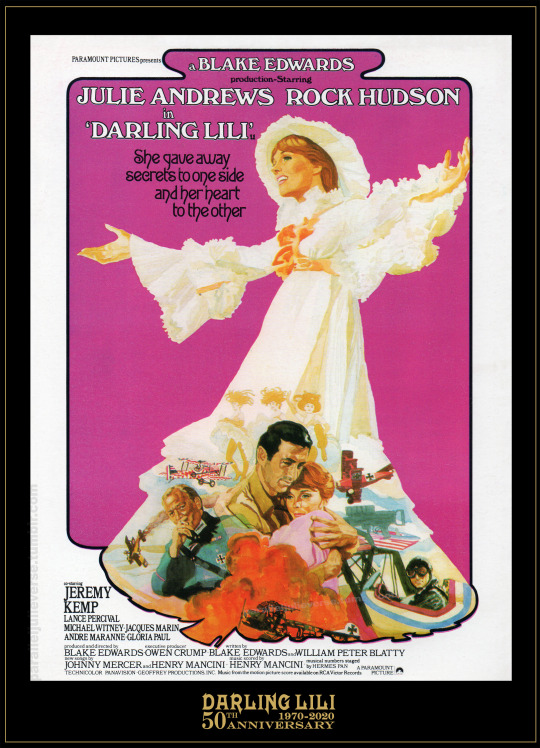
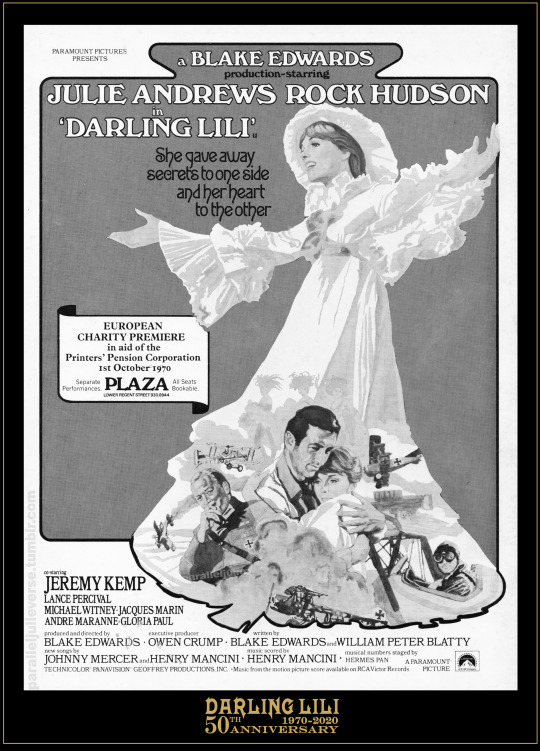
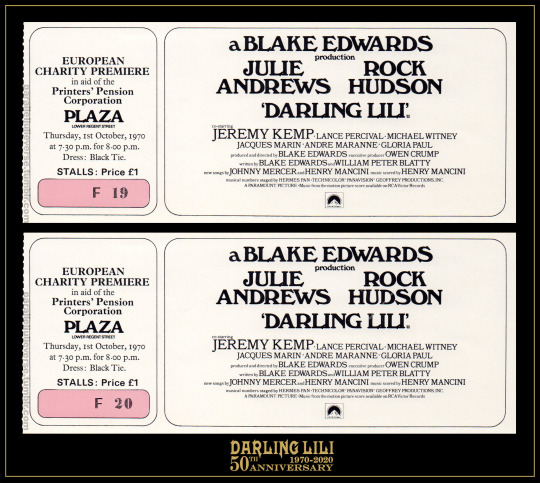
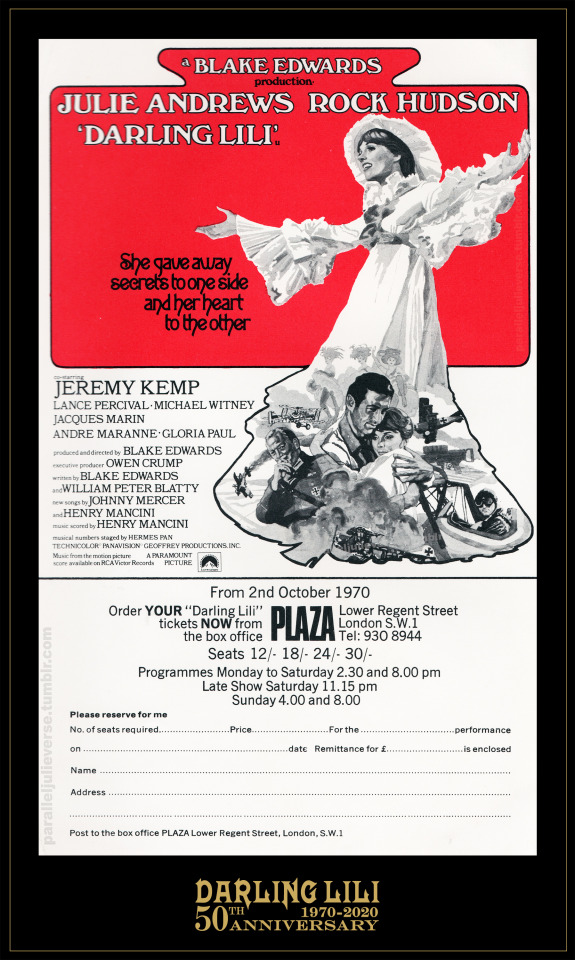
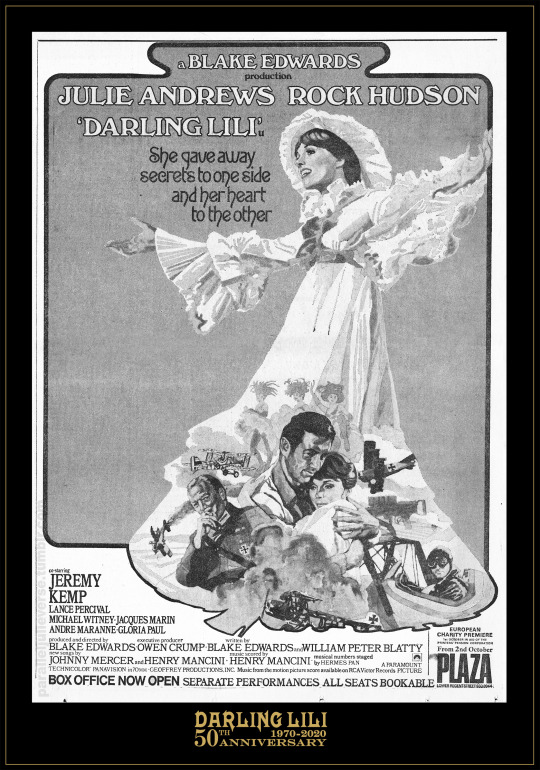
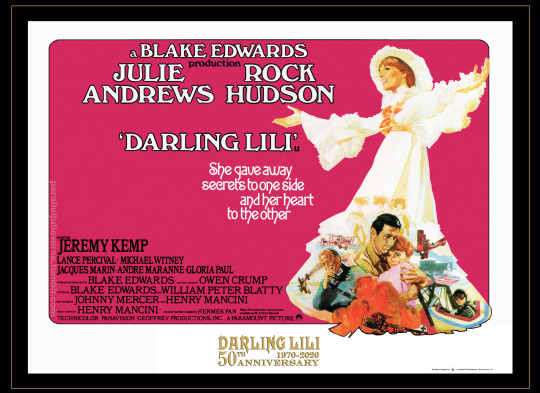
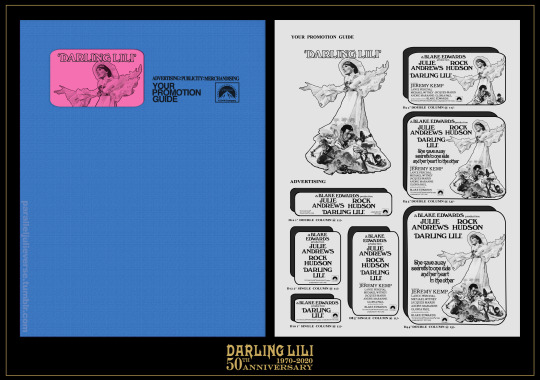
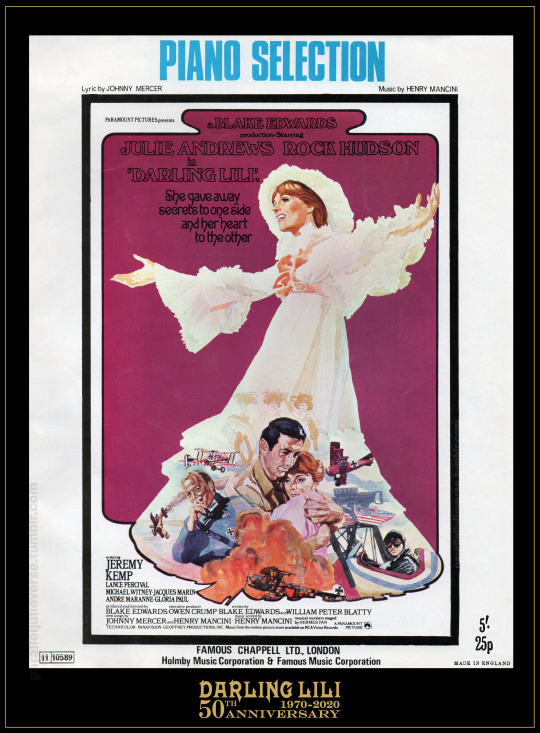
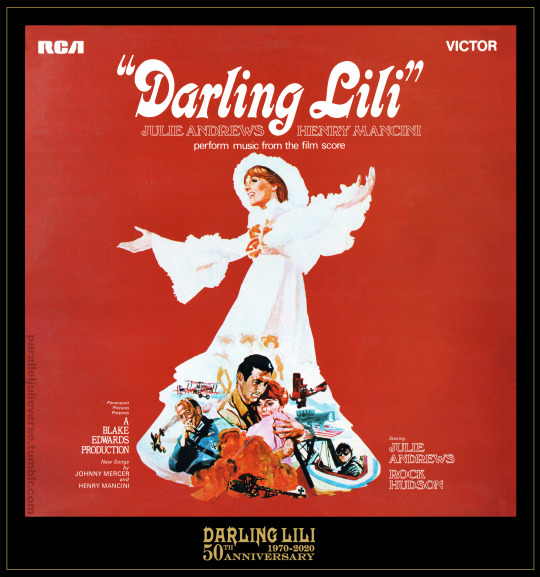
LILI IN LONDON: Darling Lili Makes Her European Bow
Fifty years ago this week, Darling Lili had its official European Premiere at the Plaza Cinema in London on 1 October, 1970. It wasn’t the film’s first international release -- that honour fell to Japan, where Darling Lili opened at the Cinerama Theatre Tokyo on 4 July, barely two weeks after the film’s US opening. However, the London premiere was a significant occasion in the film’s wider global rollout. It was, after all, Julie Andrews’ hometown and there was considerable hope local audiences would give the film a warmer reception than had been the case in North America.
Accordingly, the UK branch of Paramount Pictures afforded Darling Lili a high profile release. They exhibited the film as a full roadshow attraction, complete with widescreen 70mm print, overture and exit music, and a 24-page souvenir programme (Klar 1970). In keeping with the era’s norms of variegated international film marketing, completely new promotional artwork was commissioned for the UK release. Featuring a central image of Julie/Lili bursting into song with her arms outstretched -- a clear nod to The Sound of Music -- with a cloudburst of narrative scenes from the film fanning across the bottom of her billowing skirt, it was an arresting design that served as a ready-made marketing logo for the campaign that could be emblazoned across the full range of advertising and merchandising (Paramount 1970).
The gala premiere took place on Thursday, 1 October -- Julie’s 35th birthday, incidentally — at the Plaza Cinema in Lower Regent Street, just off Piccadilly Circus. Popularly dubbed the “Home of Paramount Pictures”, the Plaza had long been the London venue of choice for the studio’s biggest film premieres (Eyles, 26-28). Though not an official Royal Performance, the European Premiere of Darling Lili was a major society charity event with proceeds going to the Printer’s Pension Corporation, one of the oldest royally-sponsored occupational charities in the UK. Tickets were available from £1 to £5 in the stalls and £10 to £20 in the Circle with the event raising over £6000 for the charity (”Darling Lili Aids”, 12).
Official patrons of the Printer’s Pension Corporation, Lord and Lady Hartwell presided over the evening, welcoming a line of society notables and assorted local celebrities including Sue Lloyd, Judy Geeson, Clodagh Rogers and Julie Ege (“Darling Lili Has”, 32). Neither Julie nor Blake was able to make the premiere, though Julie’s parents were in attendance as honorary guests. Representing the cast, Lance Percival, who plays the comic support role of T.C. Carstairs in the film, “arrived at the Plaza in a vintage white Rolls Royce driven by a female chauffeur” (ibid.). Press reports noted that the “premiere drew large numbers of films fans to the theatre” and “the capacity audience...repeatedly applauded during the presentation of the film” (ibid.)
Following the premiere, Darling Lili opened the next day on 2 October to the general public. In a way that paralleled the experience at New York’s Radio City Music Hall, the decision to stage the film as a special event prestige picture worked well. Lili ran in roadshow release at the Plaza for over three months till 6 January 1971. It then continued to play in general release at various venues throughout London such as the ABC Cinema-Edgeware Rd well into late-1971.
Critical responses to Darling Lili in the London press ran the gamut. The film garnered several positive notices. Patrick Gibbs of the Daily Telegraph rated it “a very amiable and romantic comedy-thriller” (P14). The film “offers many pleasures,” declared the Daily Mail, with “Miss Andrews singing, dancing, delighting...with some very pretty songs...and amusing performances” (Cable, 9). The critic for the Evening Post opined:
“It is fashionable to sneer at Julie Andrews’ films as being sickly-sweet and 20 years out of date--but I can only say I enjoyed this one...Darling Lili is an enjoyable, emotional, light-hearted love story with a strong comedy element” (Watson, 7).
Other reviewers were less enthusiastic. The critic for the Daily Mirror was unsure “what kind of film Darling Lili was supposed to be”:
“Taken as a spy send-up, it’s harmless enough and drags only occasionally, but the comedy doesn’t always blend with the drama. The ending...is a cloyingly sentimental cop-out and a shade nauseating” (Richards, 19).
More than a few UK commentators baulked at the film’s irreverent treatment of World War 1--perhaps unsurprisingly given the enormous significance of the “Great War” to British history and national mythology. The critic for The Tablet, for example, called the film “a monstrous betrayal of the period.” Its “trivialisation of the issues is outrageous...I have no doubt it will be popular, but it shouldn’t be.” Still, he conceded, the film’s “photography...is very pretty and Miss Andrews’s voice is as pure as ever” (Burke, 959).
Critical concessions to “our Julie” were a notable feature of many London reviews. The all-important Times review declared:
“I wish I could like Darling Lili more. I love musicals and remain unrepentantly devoted to Julie Andrews, but this lavish new vehicle for her talents is the most upsetting sort of misfire--the sort which could so easily have been put right, with a little more thought (or a little less worry), a little more confidence in hitting the right tone and sticking to it...a disappointing waste of all the talent and money so evidently lavished on it” (Taylor, 13)
It was a sentiment echoed in The Illustrated London News:
“Miss Andrews sings well, acts decently, and even does a strip number that reveals a new side to her talent as well as a gorgeous, long-concealed, pair of legs. But, alas, not even she can save this ponderous film with its strange blend of old-and-new songs, its heavyweight prankishness, and its inordinate length” (Billington, 31).
Or again the review in The People:
“Julie has charm, grace, plus a good singing voice and Henry Mancini’s music is haunting. But the character she portrays...is hardly endearing. The story...is improbable too, even for a musical. But there are some smashing flying sequences and I like Julie’s style--so I wish it well” (Nunn, 7).
While Darling Lili opened with a splash and did decent enough business in London, it faced very different prospects elsewhere in the UK where the film became something of an inadvertent hostage in an ongoing industrial dispute. At issue was an attempt by US distributors to loosen the stranglehold and perceived old-fashioned exhibition practices of the two big regional UK chains: ABC and Odeon (“Elvin Raps”, 196; “Compromise Ends”, 24). Unable to agree on new terms, the distributors withheld several big features, including Lili, from release to these chains. As a result, Lili’s broader UK rollout was held up for months and, in some cases, years. The film didn’t get a Midlands release, for example, till April 1971 when it opened for a fixed season at the Regal Cinema in Leamington, “an independent theatre whose booking agents were able to come to terms with the distributors” (“Regal Breaks,” 2). The film then popped up intermittently at other independent theatres across the UK: Margate in September, Liverpool in October, and Belfast in January 1972.
Many major provincial markets missed out on the film completely. In a disgruntled letter to the local newspaper in early-1972, one Birmingham fan wondered if “there is a particular antipathy to musicals in our city. We have yet to see Darling Lili (Julie Andrews) and On a Clear Day You Can See Forever (Barbra Streisand), both of which have been shown in London” (Krober, 6). In a similar vein, a Reading filmgoer complained that his local ABC cinema was screening endless reissues while many new films “have yet to play in Reading..that are certainly worth a showing” such as “Julie Andrews and Rock Hudson in Darling Lili” (Suter, 10).
The UK distribution dispute was eventually resolved and Darling Lili managed to make its way out to a broader range of provincial centres including Birmingham, where it opened at the Odeon in April 1973. But by this stage the film was hardly new and whatever marketing impetus was there from the London campaign had well and truly evaporated. It was an unfortunate fizzling out for what could have otherwise been an effective national release for the film. Still, UK filmgoers who missed Darling Lili in theatres didn’t have to wait too long to catch it on the small screen. It made its British television debut as the ‘Film of the Week’ on BBC-1 on 2 April 1976 (“Film of the Week”, 22).
Sources:
Billington, Michael. “Cinema: An Ode to Lost Innocence.” The Illustrated London News. 3 October 1970: 31.
Burke, J.A.V. “Darling Lili.” The Tablet. 3 October 1970: 959.
Cable, Michael. “The Sweet English Rose is Among the Guns.” Daily Mail. 30 September 1970: 9.
“Compromise Ends US Majors’ Fight Vs. UK Circuits Over Sunday Rentals.” Variety, 13 October 1971: 24.
“‘Darling Lili’ Aids Printers’ Charity.” The Daily Telegraph. 2 October 1970: 12.
“‘Darling Lili’ Has Glittering London Bow.” The Calgary-Herald. 10 October 1970: 32.
“Elvin Raps ‘Oldfashioned Methods’ of UK Pic Biz, Hits Chains’ Bookings.” Variety. 29 April 1970: 196.
Eyles, Allen. London's West End Cinemas. Swindon : English Heritage, 2014.
“Film of the Week: ‘Darling Lili’.” Radio Times, 1 April 1976: 22.
Gibbs, Patrick. “Films: Spying With a Song.” Daily Telegraph. 2 October 1970: P14.
Harmsworth, Madeleine. “New Film.” Sunday Mirror. 4 October 1970: 29.
Klar, Arthur. Darling Lili [Souvenir Book], London: National Publishers, Inc, 1970.
Krober, Kenneth S. “Letters to the Editor: Antipathy To Musicals.” Birmingham Daily Post, 7 February 1972: 6.
Mallett, Richard. “Cinema.” Punch. No. 6787, 7 October 1970: 510.
Nunn, Ray. “But Will Lili Keep ‘Em Singing?” The People. 4 October 1970: 7.
Paramount Pictures (UK). Your Promotion Guide: Darling Lili [Advertising Campaign Manual], Chiswick, 1970.
“Picture.” Daily Telegraph. 2 October 1970: P17.
“Regal Breaks Stranglehold.” Birmingham Daily Post. 27 April 1971: 2.
Richards, Dick. “I Spy a Send-Up.” Daily Mirror. 1 October 1970: 19.
Suter, Les. “Letters to the Editor: Old Films.” Reading Evening Post. 15 June 1972: 10.
Taylor, John Russell. “Purple Passages in Paris.” The Times. 2 October 1970: 13.
Watson, Albert. “At the Cinema: Yes, I Enjoyed Julie Andrews!” Evening Post. 10 October 1970: 7.
Copyright © Brett Farmer 2020
#Darling Lili#julie andrews#european premiere#film premiere#london#plaza theatre#paramount#blake edwards#rock hudson#film history#classic film#old hollywood
11 notes
·
View notes
Note
Hey so you probably know heaps of music since you do these playlists and stuff... Could you do a "sleep" playlist? I love sleep baby sleep by broods? I'm trying to start sleeping without Netflix going so I love having music on. All good if you don't/can't, just figured I'd ask! The playlist you made for me was surprisingly good even though it's not my usual genres and yeah. Thanks! Have an amazing day!!! ❤
Hey! 1) I’m so glad you liked it! I’m generally curious whether the playlists I’ve made have jived with people’s tastes or not.
And 2) absolutely, I really enjoy making “themed” playlists as well! In any case, I made a playlist that’s five hours long. I guess not a full night’s sleep, but enough that you can set it up a little bit before you’re going to bed and have it play through half the night. There a small handful of instrumental songs, but otherwise I tried to keep it chill. In any case, here it is.
Under the cut, I’ve listed the songs for those interested.
Sleep Baby Sleep by The Broods
Bison on the Plains by Grandaddy
American Boyfriend by Kevin Abstract
Mermaid by Skott
Fear & Force by Vagabon
Postcard by Troye Sivan
Warrior by Air Traffic Controller
Daydreamer by Adele
Nikes by Frank Ocean
White Winter Hymnal by Fleet Foxes
Space Song by Beach House
Smoke Signals by Phoebe Bridgers
Burned Out by dodie
Sorry I Was Sorry by Adult Mom
You And I - Stripped by PVRIS
Daydreaming by Rosa Pullman
Oblivion by Bastille
The Shape of Water by Alexandre Desplat (from The Shape of Water)
La valse d’Amélie by Yann Tiersen (from Amélie)
TALK ME DOWN by Troye Sivan
Follow My Girl by The Japanese House
Kettering by The Antlers
Comme Des Enfants by Cœur De Pirate
If U Love Me Now (Acoustic) by MUNA
Dawn by Jean-Yves Thibaudet (from Pride and Prejudice)
3 Gymnopédies: No. 1 by Erik Satie
Once Upon a Dream by Lana Del Rey
Closing In by Ruelle
Slack Jaw by Sylvan Esso
Saturday by Phantogram
Rêverie by Claude Debussy
The Sixth Station by Joe Hisaishi (from Spirited Away)
Love Like You by Rebecca Sugar (from Steven Universe)
Slow by Rumer
Call Me Baby by Beach Bunny
Flightless Bird, American Mouth by Iron & Wine
The Great Escape by Patrick Watson
To Build a Home by The Cinematic Orchestra
Ace by Noname
Youth by Daughter
Love Has No Limits by Fleurie
Hide and Seek by imogen Heap
I Need Some Sleep by Eels
Sea of Love by Cat Power
How To Disappear Completely by Radiohead
Matthew by Shortly
Waves (Piano) by chloe moriondo
Seven Words by Weyes Blood
Sunbeam by Flo•res
Jealousy by SASMI
Direct Address (Audiotree Live Version) by Lucy Dacus
Shadowboxing by Julien Baker
Karen Don’t Be Sad by Miley Cyrus
Drone Bomb Me by ANOHNI
Truss Me by Lower Dens
Up We Go by Lights
All Alright by Sigur Rós
Foreground by Grizzly Bear
placeholder by Hand Habits
reverie by isaac gracie
Notion by Tash Sultana
Nothing Arrived (Spotify London) by Villagers
If You Need To, Keep Time On Me by Fleet Foxes
Tears For Affairs by Camera Obscura
Mary by Big Thief
You byKeaton Henson
Waiting Game by BANKS
I Need My Girl by The National
Different Now by Chastity Belt
Half-Light byRostam
Already Gone by Alvvays
feelings are fatal by mxmtoon
Nice and Quiet by Bedouine
How It Gets In by Frightened Rabbit
baglaens by Lowly
I Will Follow You Into the Dark by Death Cab for Cutie
Be Here Now by Gustavo Bertoni
(No One Knows Me) Like the Piano by Sampha
This Woman’s Work by Greg Laswell
Cold Is the Night by The Oh Hellos
Moon River by Henry Mancini
3 notes
·
View notes
Text
2CELLOS

SCORE
2CELLOS presenta el videoclip del tema principal de la película La lista de Schindler, tema incluido en el CD Score.
Consigue el álbum aquí
Mira el vídeo haciendo clic aquí.
2CELLOS, el dúo instrumental más dinámico y eléctrico de la música, van al cine con su nuevo álbum, Score, (Portrait/Sony Music Masterworks) que estará disponible a partir del 17 de Marzo de 2017. Score lleva el sonido y estilo innovador de 2CELLOS a las melodías más populares jamás escritas para el cine y la televisión, tanto clásicas como contemporáneas. En Julio de 2017, el dúo promocionará su nuevo álbum con una gira internacional que comenzará en EEUU.
Desde que causaran sensación con su extraordinaria versión del vídeo “Smooth Criminal” de Michael Jackson alcanzando millones de visitas en Youtube en 2011, los chelistas croatas Luka Šulić y Stjepan Hauser, han producido tres álbumes de gran energía para Sony Music Masterworks. Score los encuentra en un momento en el que exploran un sonido más tradicional. En este disco cuentan con la colaboración que mejor acompaña a su virtuosismo: la Orquesta Sinfónica de Londres, con el director/arreglista Robin Smith a la cabeza. Šulić y Hauser también co-produjeron Score con Nick Patrick (Elvis Presley/Royal Philharmonic Orchestra, Russell Watson, Il Divo, Plácido Domingo).
“¡Nos encanta la música de películas! Este álbum contiene algunas de nuestras piezas favoritas, que han sido creadas por nuestros compositores preferidos de música para películas. Tener la oportunidad de crear los arreglos para chelo a la vez que trabajábamos nada menos que con la Orquesta Sinfónica de Londres ha sido un sueño hecho realidad,” dice Stjepan.
El álbum abre con un arreglo de las melodías que ponen música a Juego de Tronos de Ramin Djawadi, culminando con el Tema Principal con el que el inquietante sonido de los chelos anuncia cada uno de los episodios que podrían ser los más esperados de la televisión contemporánea.
Los temas que acompañaron algunos de los momentos más épicos en la historia del cine también reciben nuevos arreglos; grandes favoritos ganadores de Premios Oscar como la canción de la música compuesta por James Horner para la película Titanic (“My Heart Will Go On”), la música de John Williams para La Lista de Schindler y la música de Vangelis para Carrozas de Fuego, al igual que “For the Love of a Princess” de Braveheart (también de Horner); “May It Be” de El Señor de los Anillos: La Comunidad del Anillo (presentado en la película por Enya); y la inspiradora “Now We Are Free” de Gladiator, creada por el compositor de música de cine Hans Zimmer, Lisa Gerrard y Klaus Badelt.
La belleza del sonido del chelo combina a la perfección con unos cuantos temas románticos. Entre ellos encontramos la canción “Moon River” de Henry Mancini/Johnny Mercer de la película Desayuno con diamantes (“Moon River”); los hermosos temas de Ennio Morricone para las películas Cinema Paradiso y Malena; el tema de amor de Nino Rota para El Padrino; el tema ganador del Oscar de Francis Lai para la película Love Story; el tema de Hans Zimmer para Rain Man; y la encantadora “Cavatina” de Stanley Myers que se escucha en El Cazador.
2CELLOS han forjado un estilo propio que supera las barreras entre géneros musicales, desde la música clásica y de películas hasta el pop y el rock. Tan impresionantes cuando tocan Bach o Vivaldi como cuando disfrutan interpretando rock, Šulić y Hauser no conocen límites cuando se trata de tocar en directo. Han ofrecido conciertos sold-out en todo el mundo y también han acompañado a Sir Elton John como parte de su banda y abriendo sus conciertos con gran éxito.
Sony Music Masterworks se compone de los sellos Masterworks, Sony Classical, OKeh, Portrait y Masterworks Broadway. Para actualizaciones por email y más información visita www.SonyMasterworks.com.
Listado de canciones:
1. Game of Thrones Medley (Game of Thrones)
2. May it Be (Lord of the Rings)
3. For the Love of a Princess (Braveheart)
4. Love Story (Love Story)
5. Cinema Paradiso (Cinema Paradiso)
6. Moon River (Breakfast at Tiffany’s)
7. Love Theme from The Godfather (The Godfather)
8. My Heart Will Go On (Titanic)
9. Rain Man Theme (Rain Man)
10. Cavatina (Deer Hunter)
11. Malena (Malena)
12. Schindler’s List Main Theme (Schindler’s List)
13. Titles from Chariots of Fire (Chariots of Fire)
14. Now We are Free (Gladiator)
ENCUENTRA A 2CELLOS AQUÍ:
WEBSITE: http://www.2cellos.com/
YOUTUBE: https://www.youtube.com/user/2CELLOSlive
FACEBOOK: https://www.facebook.com/2cellos
SPOTIFY: http://open.spotify.com/artist/6Fi8CHfO8WGtu3yO8c2Mc4
TWITTER: https://twitter.com/2cellos
INSTAGRAM: https://instagram.com/2cellosofficial/
CONSIGUE SCORE AQUÍ:
Amazon: http://smarturl.it/Score2CELLOS-cd
Amazon mp3: http://smarturl.it/Score2CELLOS-ad
Google Play: http://smarturl.it/Score2CELLOS-gp
iTunes: http://smarturl.it/Score2CELLOS
ESCUCHA SCORE AQUÍ:
Apple Music: http://smarturl.it/Score2CELLOS-am
Spotify: http://smarturl.it/Score2CELLOS-str
youtube
0 notes